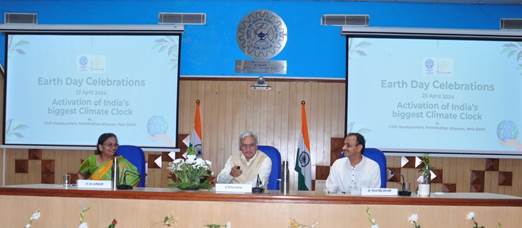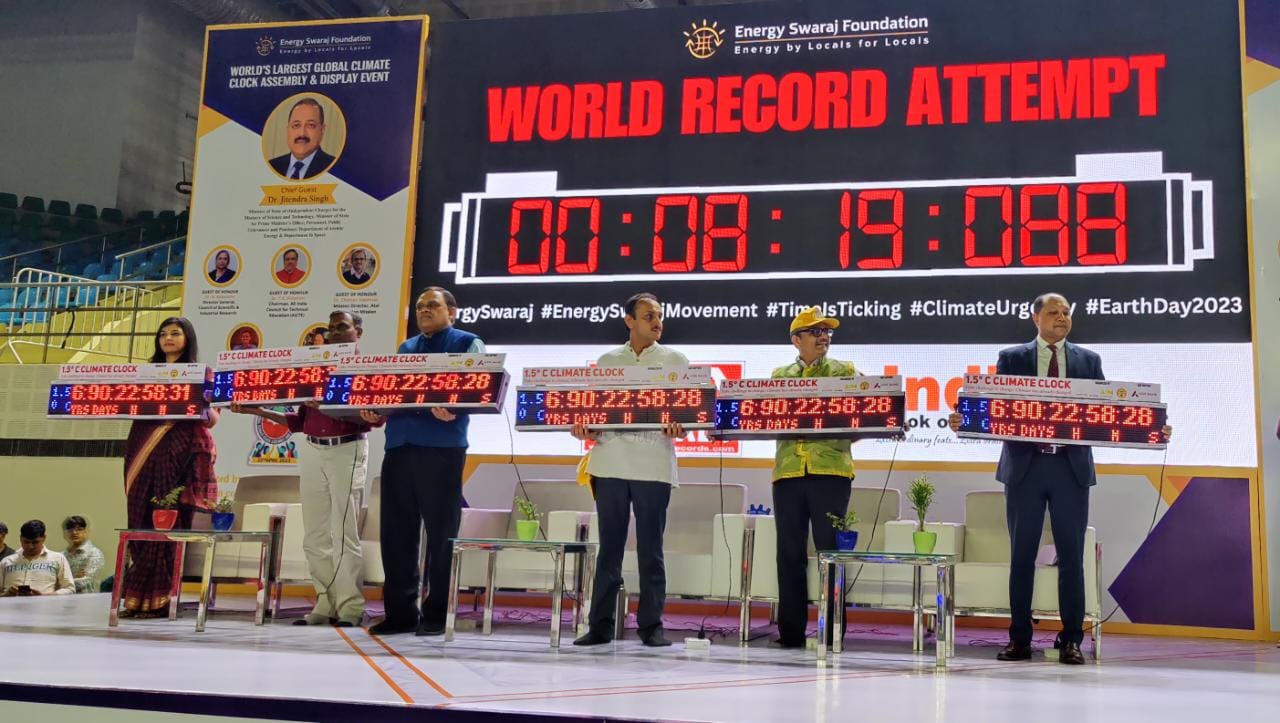To commemorate Earth Day, the Council of Scientific & Industrial Research (CSIR) unveiled India’s largest Climate Clock at their headquarters in Rafi Marg, New Delhi. This significant event underscores CSIR’s commitment to enhancing public awareness about the detrimental effects of climate change and the urgency of taking action. The Climate Clock serves as a vivid reminder of the urgency in combating climate change. It ticks down the time we have left to prevent global temperatures from rising by 1.5 degrees Celsius—a critical threshold according to the 2015 Paris Agreement, which aims to cap warming well below 2°C, and ideally at 1.5°C, to avert severe environmental consequences.

The Energy Swaraj Foundation highlights that we have a remaining “carbon budget” of 280 billion tonnes of CO2 to stay within this 1.5°C limit. However, with current annual CO2 emissions at about 43 billion tonnes, our window is rapidly closing. Simple math tells us we have approximately 6.5 years left at current rates. This stark timeline is digitally displayed on the Climate Clock, marking each second as it passes, emphasizing the pressing need for immediate and decisive action to safeguard our planet.
Advocacy for Energy Literacy: Glorifying Earth Day
Professor Chetan Singh Solanki from IIT Bombay and founder of the Energy Swaraj Foundation emphasized the critical need for energy literacy among Indian citizens during his speech at the event. He passionately argued that minimizing energy consumption is imperative for every individual to mitigate the impacts of climate change. His call to action stressed the importance of not only understanding but also practicing energy conservation in daily life to contribute to a sustainable future.

Insights from the CSIR AMRIT Lecture
The celebration also featured the CSIR AMRIT Lecture, delivered by Dr. Shailesh Nayak, the former Secretary of the Ministry of Earth Science and current Director of the National Institute of Advanced Studies. Dr. Nayak’s lecture, titled “Unraveling the Secrets of Triggered Earthquakes: The Lighthouse Project of Scientific Drilling in Koyna,” provided profound insights into the innovative approaches being taken in scientific research to study earthquake triggers. This lecture is part of the AMRIT series aiming to disseminate pioneering ideas and foster scientific dialogue that can lead to impactful research and development initiatives.
CSIR’s Commitment to Environmental Education
Dr. N Kalaiselvi, the Director-General of CSIR, highlighted the educational initiatives undertaken in partnership with the Energy Swaraj Foundation. She revealed that a significant number of CSIR staff and scientists have participated in Energy Literacy Training as part of this collaboration. Speaking at the event, Dr. N Kalaiselvi, highlighted the significance of Earth Day as a call to action for environmental protection. She shared that through a collaboration with the Energy Swaraj Foundation, a substantial number of CSIR scientists and staff have participated in Energy Literacy Training.
Additionally, climate clocks from the Foundation are now a common feature in many CSIR laboratories, underscoring a commitment to sustainability and environmental awareness. Moreover, she shared that similar climate clocks have been installed across various CSIR labs nationwide, symbolizing a unified commitment to environmental conservation and education. This effort aligns with CSIR’s broader mission to harness scientific knowledge for the practical and sustainable benefit of the nation.
Conclusion:
The activation of India’s biggest Climate Clock at the CSIR headquarters serves as a powerful symbol of the scientific community’s role in environmental advocacy. The installation of this clock not only marks a monumental day but also serves as a constant reminder of the ticking timeline we face to address environmental challenges effectively.
By integrating education, innovation, and public engagement, CSIR not only commemorates Earth Day but also propels forward the vital discourse on climate action. As the clock ticks, it reminds us of the ongoing and urgent work needed to safeguard our planet for future generations. Through initiatives like these, CSIR continues to be at the forefront of India’s journey towards a more sustainable and resilient future.


